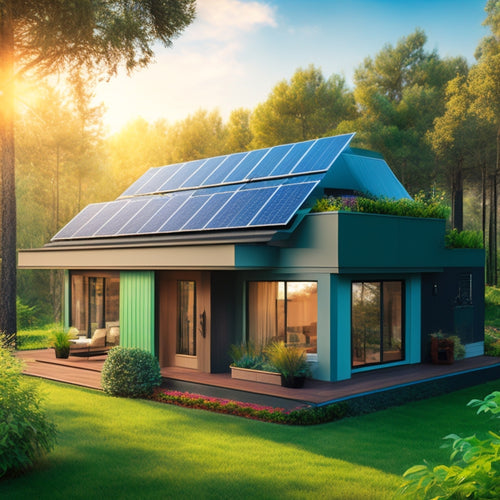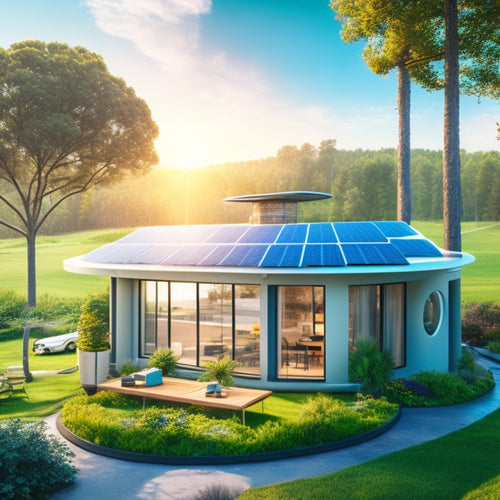
10 Best Energy-Efficient External Hard Drives for Sustainable Offices
Share
When it comes to sustainable offices, you need external hard drives that balance data storage needs with energy efficiency. Look for drives with low power consumption (under 5W), eco-friendly certifications like Energy Star, and sustainable materials that reduce e-waste. Advanced power management systems, idle mode, and automatic sleep functions can also minimize energy use. Notable models include Western Digital Caviar Green, Seagate BarraCuda Green, and Toshiba, which prioritize low power consumption without sacrificing performance. You'll want to investigate these options further to find the best fit for your office's unique needs and take a significant step towards reducing your environmental footprint.
Key Takeaways
- Look for external hard drives with low wattage consumption, ideally under 5W, to minimize energy usage without performance loss.
- Eco-friendly certifications like Energy Star, RoHS, and WEEE ensure compliance with green computing standards and sustainable materials.
- Advanced power management systems with adaptive power management and idle mode reduce energy consumption and lower carbon footprint.
- Compact designs with efficient heat dissipation and durable materials reduce desk space and minimize e-waste.
- Consider Solid State Drives (SSDs) which consume less power than traditional Hard Disk Drives (HDDs) for energy-efficient data storage.
Energy-Efficient Storage Solutions
Your data storage needs are growing, and so is your energy bill. As you investigate ways to reduce your environmental footprint, consider energy-efficient storage solutions.
Cloud storage is an attractive option, allowing you to access files remotely while reducing your reliance on physical hardware. However, this approach may not be suitable for sensitive data or high-bandwidth applications.
Alternatively, you can opt for external hard drives that make use of renewable energy sources or have low power consumption. With the rise of renewable energy sources for EV charging, it's now possible to power your storage solutions with sustainable energy.
By integrating solar panels and wind turbines, you can notably reduce your carbon footprint. When selecting an energy-efficient storage solution, look for drives with high storage capacities, low wattage, and eco-friendly certifications.
Low Power Consumption Drives
When shopping for an energy-efficient external hard drive, you'll want to ponder eco-friendly hard drive options that prioritize low power consumption.
Look for low wattage external drives that consume less energy without sacrificing performance.
As we shift towards sustainable transportation and energy independence, it's crucial to reduce our reliance on fossil fuels and opt for renewable energy solutions.
Eco-Friendly Hard Drive Options
Enhancing your data storage capacity while minimizing environmental impact is now a reality with eco-friendly hard drive options that prioritize low power consumption. You can opt for drives made from sustainable materials, ensuring a reduced carbon footprint. Look for eco certifications like Energy Star, RoHS, and WEEE, which guarantee compliance with environmental regulations.
| Model | Power Consumption | Eco Certifications |
|---|---|---|
| Western Digital Caviar Green | 4.5W | Energy Star, RoHS |
| Seagate BarraCuda Green | 3.7W | Energy Star, WEEE |
| Toshiba X300 | 3.2W | RoHS, WEEE |
Low Wattage External Drives
Take control of your energy consumption with low wattage external hard drives, an essential step towards reducing your carbon footprint.
These drives are designed to minimize power consumption without compromising performance. By choosing low wattage external hard drives, you're not only reducing your energy bills but also contributing to a more sustainable future.
Look for drives that incorporate energy saving innovations, such as advanced power management systems, to minimize idle power consumption.
Additionally, opt for drives made from sustainable materials, which reduce e-waste and support environmentally responsible manufacturing practices.
Energy Saving Design Features
Beyond the low wattage label, energy-efficient external hard drives boast innovative design features that notably reduce power consumption.
You'll find that these drives incorporate energy saving materials, such as low-power motors and efficient power supplies, to minimize energy waste. Sustainable manufacturing processes also play an essential role in reducing the environmental impact of these devices.
For instance, some manufacturers use recycled materials and minimize packaging waste. In addition, the integration of renewable energy sources, such as solar power, can greatly reduce greenhouse gas emissions and operating costs, promoting sustainability.
Additionally, advanced technologies like idle mode and automatic sleep functions help reduce energy consumption when the drive isn't in use.
Eco-Friendly Data Backup Options
When you're shopping for eco-friendly data backup options, you'll want to look for green data storage options that not only reduce your carbon footprint but also lower your energy bills.
Integrating renewable energy sources into your data backup system can greatly decrease your reliance on fossil fuels and minimize your environmental impact.
You should opt for low power consumption devices that use advanced power management features to minimize energy waste.
Additionally, consider devices with eco-conscious design features, such as recyclable materials and minimal packaging, to further reduce their environmental impact.
Green Data Storage Options
You're likely aware that the trend towards eco-friendliness has permeated various aspects of modern life, and data storage is no exception.
As you consider your data backup options, you'll want to investigate green data storage solutions that prioritize the environment. Implementing energy-efficient practices, such as solar-powered charging stations, can greatly reduce fossil fuel dependence and lower operating costs.
Look for external hard drives made from sustainable materials, such as recycled plastics or bioplastics. Additionally, opt for devices powered by renewable energy sources, like solar or wind power.
This not only reduces your carbon footprint but also supports a more sustainable future. By choosing eco-friendly data storage options, you're taking a considerable step towards minimizing your office's environmental impact.
Low Power Consumption Devices
As data storage needs continue to grow, so does the significance of energy-efficient solutions. You need devices that can store large amounts of data without consuming excessive power.
Low power consumption devices are an essential aspect of sustainable technology. When shopping for an energy-efficient external hard drive, look for devices with low energy ratings, typically measured in watts (W).
Opt for drives that consume less than 5W during operation and idle modes. Some devices even feature adaptive power management, which adjusts power consumption based on usage.
Eco Conscious Design Features
Eco-friendly design features are now an essential consideration in external hard drives. When shopping for a sustainable data backup option, you'll want to look for devices made with sustainable materials, featuring eco-friendly packaging, and manufactured using energy-efficient processes.
Opt for drives with recyclable components, which can help reduce electronic waste and conserve resources. Moreover, consider drives powered by renewable energy sources, which can minimize carbon footprint. A thorough lifecycle assessment can help you evaluate a drive's environmental impact.
In addition, biodegradable materials and ethical sourcing practices can also contribute to a more eco-conscious design. By prioritizing these features, you can enjoy a guilt-free data backup experience that aligns with your values of freedom and sustainability.
Sustainable External Hard Drives
Sustainable external hard drives are built with environmentally responsible design principles in mind, focusing on minimizing their ecological footprint throughout their entire lifecycle.
You'll find they're made with sustainable materials, featuring recyclable components that reduce waste and minimize environmental impact.
Look for eco certifications like ENERGY STAR or RoHS, which guarantee the drive meets rigorous standards for energy efficiency and sustainability.
Manufacturers conduct energy audits to optimize performance while reducing carbon footprint. Some even invest in renewable energy to power their operations.
By choosing a sustainable external hard drive, you're supporting waste reduction and longevity strategies.
Plus, green packaging reduces unnecessary waste.
Green Technology for Offices
You're likely already using sustainable external hard drives to reduce your personal environmental impact.
Now, it's time to take it to the next level by integrating green technology into your office setup. Sustainable computing is no longer a luxury, but a necessity. By shifting to renewable energy sources, you'll not only minimize your carbon footprint but also reduce your energy bills.
Start by evaluating your office's energy consumption and identifying areas for improvement. Consider investing in solar panels or wind turbines to power your office.
Additionally, look for energy-efficient devices and appliances that can help you achieve your sustainability goals.
High-Capacity Low-Energy Drives
You'll want to contemplate high-capacity low-energy drives that boast impressive energy efficiency ratings, often achieved through advancements in green technology.
These drives typically feature power-saving features like low-RPM motors, high-density storage, and intelligent power management systems.
Energy Efficiency Ratings
Your data storage needs are growing, and so is your concern about the environmental impact of your external hard drives.
As you shift to sustainable office practices, understanding energy efficiency ratings is vital. Look for drives with low power consumption, measured in watts (W), and high storage capacity, measured in terabytes (TB).
Energy efficiency metrics, such as idle power consumption and active power consumption, will help you make an informed decision. Opt for drives with high energy efficiency ratings, like the ENERGY STAR certification, which guarantees they meet energy efficiency standards set by the U.S. Environmental Protection Agency.
Green Technology Advancements
Several breakthroughs in green technology have led to the development of high-capacity low-energy external hard drives, which are revolutionizing the data storage environment.
You're now able to store massive amounts of data while reducing your carbon footprint. These innovative drives employ renewable energy sources, smart technology, and sustainable materials to minimize waste reduction.
By conducting energy audits, manufacturers can identify areas for improvement, leading to efficiency innovations that benefit the environment. Eco certifications guarantee that these drives meet rigorous standards for green computing.
As you shift to a circular economy, these high-capacity low-energy external hard drives are a vital step towards a more sustainable future, giving you the freedom to store your data responsibly.
Power-Saving Features
As high-capacity low-energy external hard drives continue to advance, their power-saving features have become a hallmark of their eco-friendly design.
You'll find that these drives employ advanced power management systems to minimize energy consumption. One key feature is automatic sleep, which puts the drive into a low-power state when not in use. This greatly reduces standby power consumption, making it an attractive option for sustainable offices.
Additionally, many drives feature adaptive power management, which flexibly adjusts power consumption based on workload. This guarantees that the drive only uses the energy it needs, reducing overall power draw.
Environmentally Friendly Storage
With the growing awareness of climate change and environmental degradation, consumers are increasingly seeking out eco-friendly alternatives in every aspect of their lives, including data storage.
You're likely no exception, and that's why you're looking for environmentally friendly storage solutions. When it comes to external hard drives, you should consider devices made from sustainable materials that minimize e-waste.
Look for manufacturers that use recyclable materials, bioplastics, or conflict-free minerals. Additionally, some companies power their facilities with renewable energy, reducing their carbon footprint.
Energy-Saving Data Storage Devices
Beyond the environmental benefits of sustainable materials, energy-saving data storage devices can greatly reduce your carbon footprint by minimizing power consumption. You can opt for solid state drives (SSDs) that consume notably less power compared to traditional hard disk drives (HDDs). Additionally, consider portable backup devices that are designed to be energy-efficient and compact. These devices are perfect for offices that require frequent data backups without compromising on power efficiency.
| Device Type | Power Consumption |
|---|---|
| Solid State Drive (SSD) | 2-5 watts |
| Hard Disk Drive (HDD) | 6-15 watts |
| Portable Backup Device | 1-3 watts |
Efficient External Hard Drive Designs
Optimize your data storage setup by exploring efficient external hard drive designs that prioritize energy efficiency without sacrificing performance.
You'll find that compact designs not only reduce energy consumption but also save precious desk space. Durable materials, such as aluminum or steel, are often used in eco-friendly external hard drives, making them more resistant to wear and tear.
These materials also tend to dissipate heat more efficiently, reducing the risk of overheating and further minimizing energy waste. By choosing an external hard drive with an efficient design, you'll be able to store and access your data while keeping your environmental footprint in check.
Look for drives that have earned energy-efficient certifications, such as ENERGY STAR, to guarantee you're getting a product that meets rigorous eco-friendly standards.
Power-Saving Data Solutions
As you seek to minimize your environmental impact, you'll want to investigate power-saving data solutions that complement your energy-efficient external hard drive.
These solutions can greatly reduce energy consumption, leading to a more sustainable office setup. One key area to focus on is data transfer optimization, which involves streamlining data transmission to reduce power consumption. This can be achieved through advanced compression algorithms, parallel processing, and optimized data caching.
Additionally, consider implementing thermal management techniques, such as heat sinks and ventilation systems, to prevent overheating and reduce the energy required to cool your devices.
Frequently Asked Questions
Are Energy-Efficient External Hard Drives Compatible With All Devices?
When choosing an energy-efficient external hard drive, you'll want to take into account compatibility factors, such as USB port type and device requirements, to guarantee seamless integration with your devices, as not all drives are universally compatible.
Do Eco-Friendly Hard Drives Compromise on Data Transfer Speeds?
As you steer through the digital highway, you'll find that eco-friendly hard drives aren't speed bumps; they utilize advanced data transfer technology, offering competitive speed comparisons to traditional drives, ensuring your files arrive swiftly, without sacrificing your values.
Can I Use Energy-Efficient Hard Drives for Long-Term Data Archiving?
You can use energy-efficient hard drives for long-term data archiving, enjoying cost benefits from reduced power consumption while minimizing your environmental impact; these eco-friendly drives are designed for reliability, ensuring your data remains safe and accessible.
Are Power-Saving Hard Drives More Prone to Mechanical Failure?
As you traverse the online environment, a fragile thread of reliability weaves through power-saving hard drives, where reduced power consumption often compromises mechanical durability, leaving you to ponder: will the energy-efficient path lead to data darkness or liberation?
Do Sustainable External Hard Drives Require Special Maintenance Routines?
You'll be relieved to know that sustainable external hard drives don't require special maintenance routines, but following general maintenance tips and sustainable practices, like regular backups and shutting down when not in use, will guarantee peak performance and extend their lifespan.
Related Posts
-

3 Green HVAC Filters for Solar-Powered Homes
When outfitting your solar-powered home with an HVAC system, you'll want to choose filters that align with your commi...
-

Gamify Your Home's Energy Generation and Savings
You're taking the next step in optimizing your home's energy generation and savings by utilizing the power of gamific...
-

Transform Your Outdoor Space With Recycled Plastic Lumber
By incorporating recycled plastic lumber into your outdoor design, you're not just building a deck or installing a fe...


